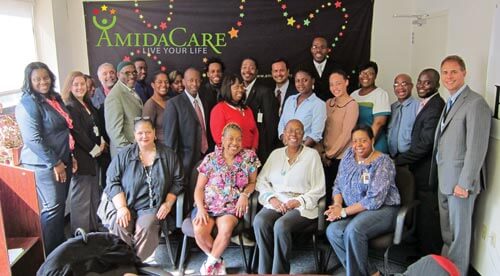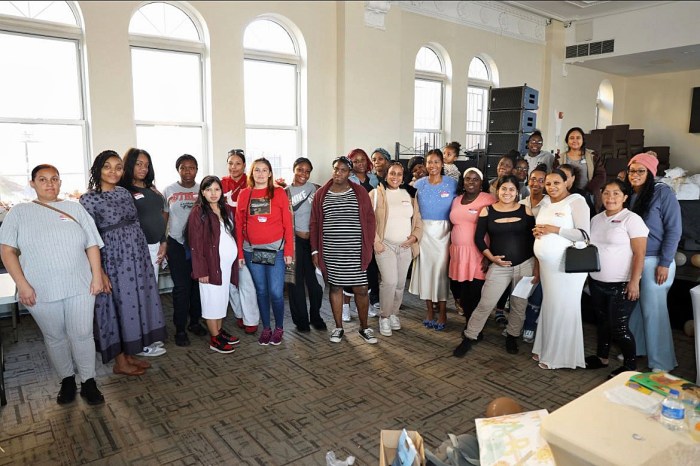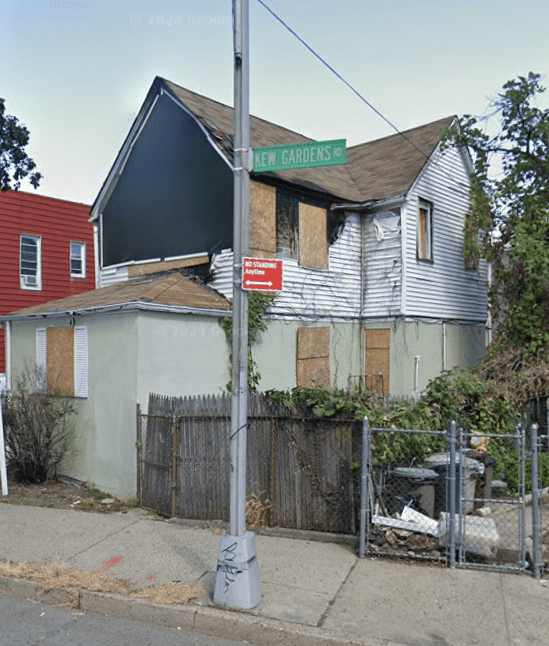Non-profit health plan Amida Care treats more than 2,000 low-income HIV/AIDS patients in Brooklyn. Today, thanks a bold, new innovative mobile engagement team established by State Sen. Velmanette Montgomery (D-Brooklyn) and Assemblymember Annette Robinson (D-Bedford Stuyvesant), Amida Care patients have 25 percent fewer hospitalizations.
“Although an HIV-positive diagnosis is no longer considered a death sentence, many Brooklyn residents, particularly low-income people and communities of color, are disproportionately impacted by the disease,” said State Senator Velmanette Montgomery. “Through their innovative mobile engagement teams and compassionate health outreach workers, Amida Care is ensuring that those in our community who are impacted by the disease are getting the life-saving care and support they need.”
In operation since 2003, Amida Care is a New York State Special Needs Plan (SNP) that provides high-quality care at lower cost than traditional Medicaid to more than 5,600 low-income New Yorkers living with HIV/AIDS. It offers a choice of more than 175 HIV Specialist Primary Care Providers (PCPs) at 24 hospitals throughout New York City.
“Amida Care has succeeded in reaching out to thousands of vulnerable Brooklyn residents living with HIV/AIDS and providing them with the highest quality healthcare possible,” said Assemblymember Annette M. Robinson. “Through its innovative mobile engagement teams, Amida Care is improving the health and quality of life of thousands of Brooklyn residents.”
Amida Care’s innovative model includes deploying community health outreach workers and mobile engagement teams in key neighborhoods, and conducting intensive outreach to ensure that at-risk individuals receive continuous care. Amida Care’s model is credited with improving patients’ access to life saving care, while reducing hospital stays by 25%.
Interfaith Medical Center and SUNY Downstate, two Brooklyn hospitals, play an integral role in Amida Care’s SNP by providing HIV+ patients direct access to specialists and ensuring they continue to receive the medical attention they need.
“With more than 1,200 patients under our care, and innovative programs that address medical and psychosocial issues of HIV patients across a variety of ages and backgrounds, Downstate has long been a leader in HIV care in New York City,” said Dr. Jack DeHovitz, distinguished service professor and director of the HIV Center for Women and Children at SUNY Downstate. “Amida Care provides an additional level of care management which complements our diverse array of services. As a result, our clinical and research programs excel in patient retention and quality of care.”
“Interfaith Medical Center strives to provide HIV patients with high-quality services and 1-on-1 care to ensure they are able to live their lives to the fullest,” said Dr. Shamim Ahmed, Pprovider at Interfaith. “We are proud of our partnership with Amida Care- the plan has phenomenal success with patient outreach by using its innovative mobile engagement teams and community workers. Amida Care complements our services, and as a result, we are able to treat over 500 low-income residents living with HIV.”
Denice R., a member of Amida Care who is both HIV+ and a survivor of breast cancer, has been receiving her medical care in Brooklyn for over 20 years. Amida Care introduced her to the appropriate doctors, and today she said that joining the plan is the best decision she ever made.
“Amida Care has always been there for me,” said Amida Care member Denice R. “They remind me of my appointments and medications, and the healthcare providers treat me with dignity and respect.”
In traditional “fee-for-service” Medicaid, there is little coordination of care for people living with HIV/AIDS, and the care is both of lower quality and more expensive than it needs to be. Amida Care provides the most cost-effective care possible by focusing on keeping members enrolled in continuous treatment and ensuring that all physicians are HIV/AIDS specialists.
Amida Care was established by major AIDS non-profits and community organizations in New York City to improve the health of low-income people with HIV/AIDS, who often also face the challenges of homelessness, poverty or substance abuse. Even though many of Amida Care’s members have histories of mental illness or incarceration, the plan has succeeded in keeping “hard-to-reach” individuals in continuous, high-quality care.
“By reaching out to people living with HIV/AIDS and increasing the number of people on medication treatment. Amaida Care has decreased the number of its members’ hospitalizations by 25 percent recognize non-profit health care plan Amida Care and reduced hospital lengths of stay by 15 percent,” explained Doug Wirth, Amida Care CEO. “This not only saves money, it also improves the quality of life for our members, their families, and the neighborhoods they live in.”
Amida Care’s approach has resulted in increased quality in care and reduced costs in comparison with traditional fee-for-service Medicaid programs. For example, a 2010 survey by the New York State Department of Health found that 92 percent of members are engaged in regular ongoing care- a remarkably high rate of participation in a population with significant social and economic challenges.




























